Learn AI
today.
Get to learn the core knowledge, practical skills, and latest trends in Python Programming and Deep Learning technologies. Even students without prior knowledge in programming can take these courses.

All-included
AI Application Development Education
Get access to an exclusive easy-to-digest Deep Learning fast track. Get up to speed on the most relevant topics in less than a week.

Python Programming
To learn about AI technology, you need basic knowledge in Python programming. If you are new to Python, you can learn the basics of programming and necessary Python syntax through this course. Then, you will be able to understand the deep learning courses without any difficulties.

Deep Learning
You will learn about modern trends in AI technology and deep learning technology. Also, our experts will teach you basic, intermediate, and advanced deep learning theories and frameworks.

Enterprise Know-how
Our courses focus on understanding how large enterprises and AI companies around the world actually deploy AI-based services and build their own cloud-based AI services. You will learn the computer vision technology, network technology, and DevOps technology needed to develop AI services.
Your journey to AI.
Let our Deep Block experts shine a light on your first steps as you delve into the fascinating world of AI. Learn more about Python programming and Deep Learning in 7 hours.
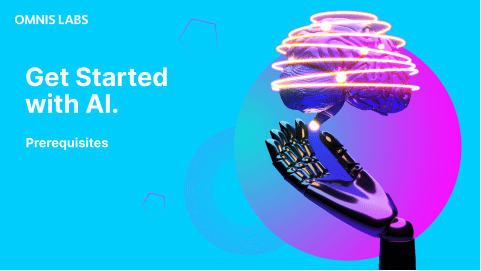
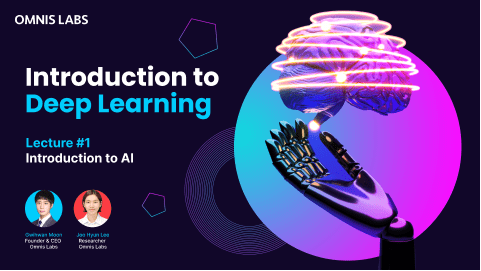
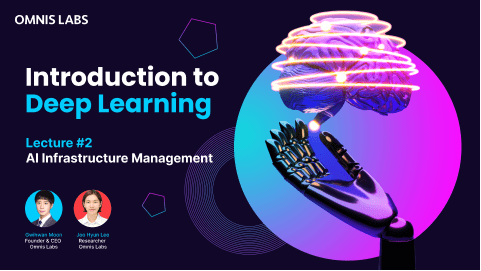
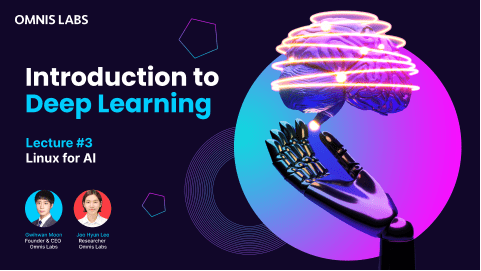
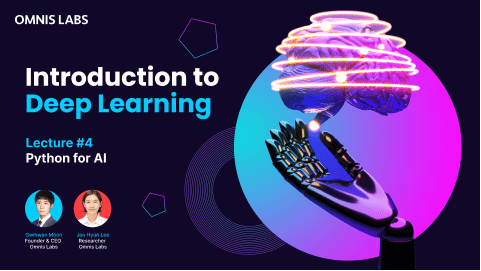
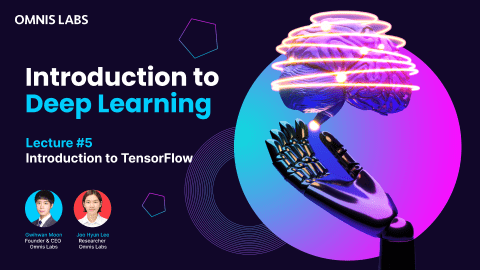
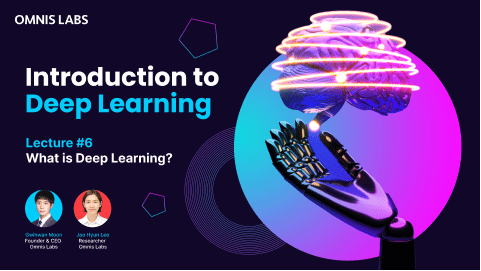
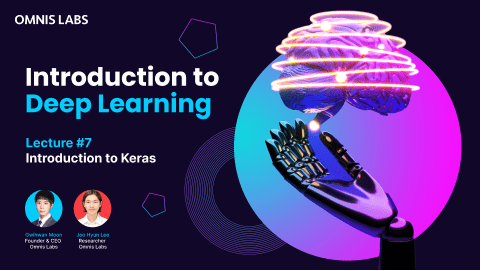
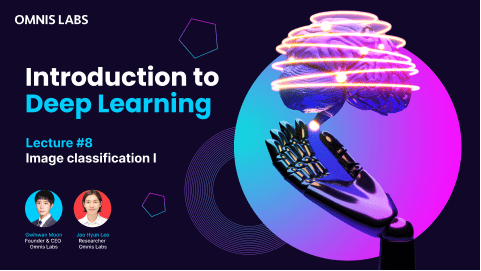
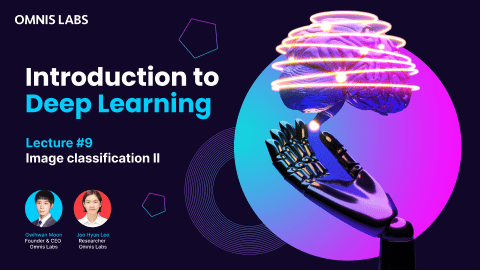
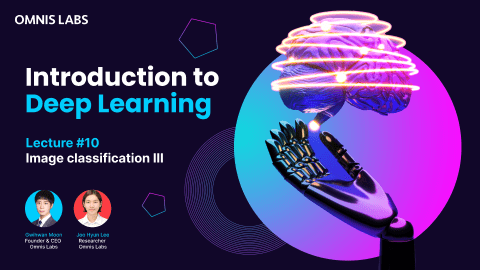
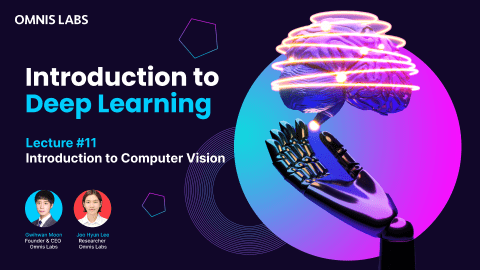
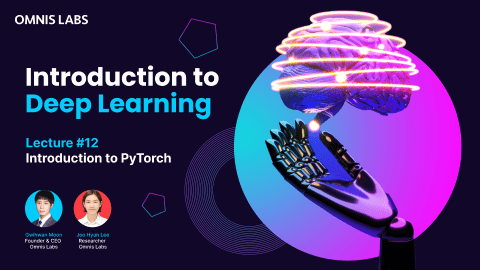
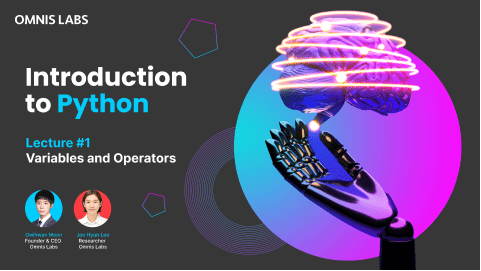
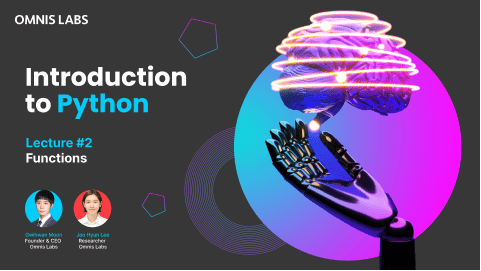
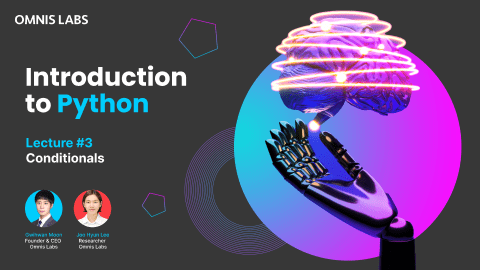
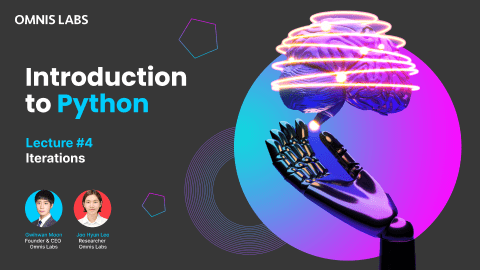
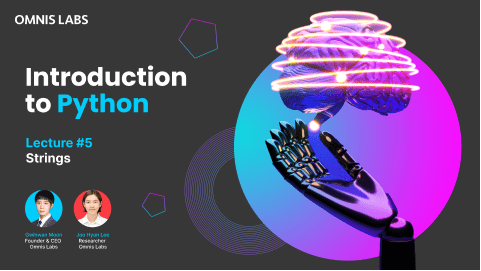
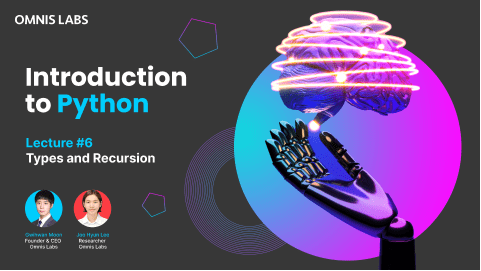
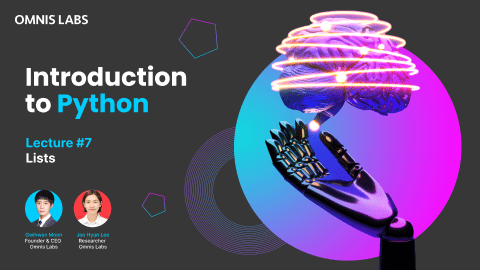
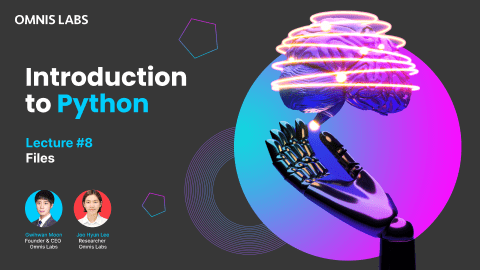
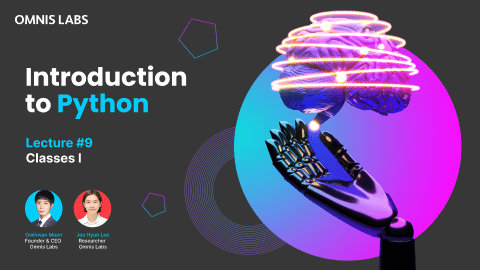
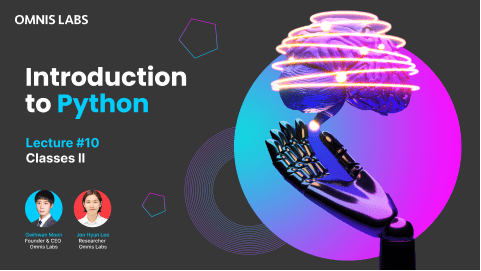
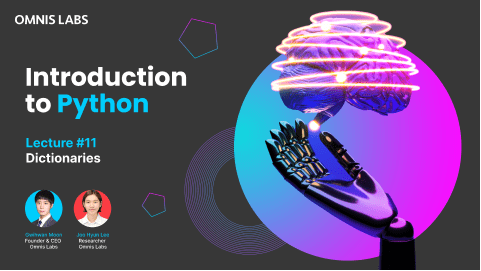
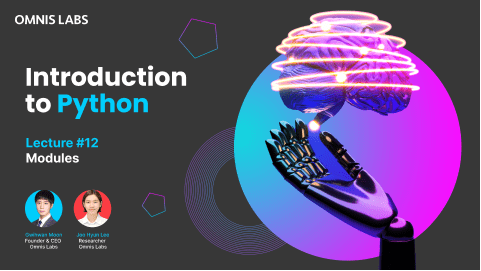
Choose your cohort.
Check our full list of courses to learn more about the lastest deep learning and computer vision technologies.
Course 1 - Basics | Introduction to Python
This course is for students who are new to programming and want to prepare themselves before learning about Deep Learning. We focus on skills necessary for learning Deep Learning technology such as basic Python syntax and application. Even students without prior knowledge in programming can take the Deep Learning Basics course after taking this course.
12 Lectures > Watch Now
| # | Lecture Topic | Lecture Goals |
| 1 | Variables and Operation | Understanding basic concepts of programming |
| 2 | Functions | Understanding functions |
| 3 | Conditionals | Understanding conditional statements |
| 4 | Iterations | Understanding conditional statements |
| 5 | Strings | Understanding string data type |
| 6 | Types and Recursion | Understanding type system and recursion |
| 7 | Lists | Understanding Lists and List methods |
| 8 | File I/O | Understanding File I/O |
| 9 | Class 1 | Basic understanding of Class |
| 10 | Class 2 | Advanced understanding of Class |
| 11 | Dictionaries | Understanding Dictionaries |
| 12 | Modules | Understanding python modules |
Course 2 - Basics | Introduction to Deep Learning
In this course, you will understand modern AI technology trends and learn basic deep learning theories and frameworks. This course is for students with little or no experience in Deep Learning. We will focus on theories and practices necessary for learning AI technology and development.
12 Lectures > Watch Now
| # | Lecture Topic | Lecture Goals |
| 1 | Introduction to AI | Understanding modern AI |
| 2 | AI infrastructure management | Learning how to set up AI development environment |
| 3 | Linux for AI | Learning basic skills to handle filesystem with Python |
| 4 | Python for AI | Learning system library of Python |
| 5 | Introduction to Tensorflow | Learning how to use Tensorflow |
| 6 | What is Deep Learning? | Learning basic mathematical foundation of deep learning |
| 7 | Introduction to Keras | Learning how to use Keras |
| 8 | Image Classification 1 | Learning image classification AI |
| 9 | Image Classification 2 | Learning image classification AI |
| 10 | Image Classification 3 | Build image classification AI for Caltech101 dataset |
| 11 | Introduction to computer vision | Understanding modern computer vision technology |
| 12 | Introduction to Pytorch | Learning basics of PyTorch |
Course 3 - Intermediate | Deep Learning Intermediate
In this course, you will learn the applications of the latest deep learning technology. You will implement an AI model yourself, focusing on Object Detection, Image Segmentation models. You will learn about the latest AI models that are actually used in the industry, and implement and use the AI models yourself.
12 Lectures > Get a Quote
| # | Lecture Topic | Lecture Goals |
| 1 | Object Detection 1 | Understanding modern Object Detection technology |
| 2 | Object Detection 2 | Understanding the process of data collection, preprocessing, model training for Object Detection model |
| 3 | Object Detection 3 | Understanding the inference step and learning how to evaluate Object Detection AI model performance |
| 4 | Object Detection 4 | Explaining modern Object Detection model |
| 5 | Object Detection AI Project 1 | Project using your own data or the prepared data |
| 6 | Object Detection AI Project 2 | Evaluating model performance |
| 7 | Image Segmentation 1 | Learning modern Image Segmentation technology and the workflow of Image Segmentation AI model |
| 8 | Image Segmentation 2 | Understanding the process of data collection, preprocessing, model training for Image Segmentation model |
| 9 | Image Segmentation 3 | Understanding the inference step, learning how to evaluate Image Segmentation AI model performance, and how to optimize the model |
| 10 | Image Segmentation 4 | Understanding the inference step, learning how to evaluate Image Segmentation AI model performance, and how to optimize the model |
| 11 | Image Segmentation AI Project 1 | Project with prepared data |
| 12 | Image Segmentation AI Project 2 | Evaluating model performance |
Course 4 - Advanced | Computer Vision Expert
This course will teach you how large enterprises and AI companies around the world currently deploy AI-based services and build their own cloud-based AI services. You will learn about computer vision technology, network technology, and DevOps technology needed to develop AI services. You will then combine these technologies for the final project, build your own AI service, and create your own AI development portfolio.
12 Lectures > Get a Quote
| # | Lecture Topic | Lecture Goals |
| 1 | Network, HTML Basics for A | Understanding modern HTTP technology |
| 2 | OS, multi-thread Basics for AI | Understanding modern OS and multi-thread |
| 3 | AI service Front-end Development 1 | Understanding Javascript and modern web technology needed for AI based web-service |
| 4 | AI service Front-end Development 2 | Understanding IOT device interworking |
| 5 | Web service Development for AI 1 | Understanding web server technology for AI-based web-service development |
| 6 | Web service Development for AI 2 | Understanding web server technology for AI-based web-service development |
| 7 | Web service Development for AI 3 | Web service development for final project |
| 8 | AI Infrastructure Design and Building | Understanding system structure and design method of modern AI-based service |
| 9 | Final Project Planning | Setting the target for Object Detection AI model for the final project, finalizing plans for model development |
| 10 | Final Project 1 | Training and optimizing Object Detection AI model for the final project |
| 11 | Final Project 2 | Implementing cloud-based inference system |
| 12 | Final Project 3 | Completing and polishing the final project |
Focus on practical expertise.
Omnis Labs is an AI company founded by AI engineers who graduated from Seoul National University Computer Engineering. We have been developing various commercial AI solutions with many companies and research centers around the world over the past 4 years. Based on our rich experience in AI solutions development, we are trying our best to provide the best AI technology courses to students.
Omnis Labs has developed and delivered a variety of AI-based services to clients using the latest AI technologies and frameworks. Based on our experience in developing commercial AI solutions, AI engineers of Omnis Labs provide you necessary, practical knowledge and skills.
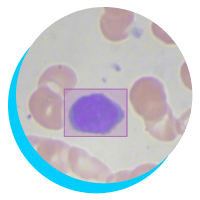
Naeun K.
Doctor
I'm a doctor in fellowship training. My colleagues and professors often combine AI technology with medical research, so I decided to join the Deep Block AI boot camp of Omnis Labs Inc. to learn about AI technology. I learned that computer vision technology can be useful in pathology. In addition, I tried building a white blood cell detection AI model for the final project and succeeded in making an AI model with good performance. I will continue to study hard, write a paper, and present at a conference.

Seowoo H.
Engineer
Through Deep Block AI Bootcamp, I was able to build my own traffic sign detection AI model that can be used in the autonomous driving industry. Through the Deep Block Boot Camp, I was able to create my own AI model portfolio, and based on these experiences and project results, I was able to get a job at an autonomous driving startup.
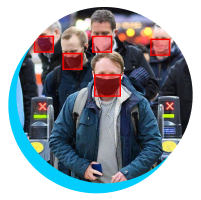
Seojun K.
Student
Back in the days, the world was suffering from the Coronavirus, and there where more regulations such as mandatory mask-wearing. During the Deep Block AI Bootcamp, I built a mask detection AI model as my final project. As a result, I was able to develop an AI model successfully and proudly explain my development experience and AI development process to interviewers.
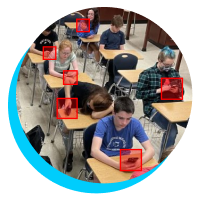
Gunwoo P.
Teacher
I am a teacher teaching high school students. I was interested in AI technology, and I tried to study it whenever I had time after work, but I was having a hard time because the courses I had been taking were so difficult.
However, through the Deep Block AI training program, I was able to learn how to develop AI models without any special knowledge in mathematics or computer science.
For the final project, I tried building an AI model that I can use to check if students are using smartphones in class, and I was able to successfully make this AI model myself. It was amazing!

Yuna L.
Student
While participating in Deep Block AI Bootcamp, I was recently told by my instructor that the movement toward environmental protection and animal and plant protection has been strengthened worldwide, and I developed an AI model to detect endangered narrow-mouthed toads as a final project. During the development process, I was able to learn clearly how to develop an object detection AI model and what to consider during the development process, and I was able to successfully develop my own narrow-mouthed toad detection AI model.

Jihan L.
Engineer
I am an engineer working in a beauty-related startup. Our company is currently developing a hair loss care software solution, and I participated in Deep Block's AI Bootcamp to learn the AI technology needed for this software.
During the three-month boot camp period, based on the instructor's kind explanation, I was able to directly implement the hair AI detection model needed to develop a hair loss care service and learn how to implement it. As an engineer working in the same field, I was able to learn a lot about AI. Thank you.
Learn More
Do you have a question? We got you covered.
Don't hesitate to contact us for any further inquiry.
Can I take these courses without any prior programming experience?
Yes, you can take the courses even if you have no prior programming knowledge. The Introduction to Python course will provide you with the necessary skills in basic Python syntax and application, which will prepare you for learning Deep Learning.
What topics are covered in the Introduction to Python course?
The course covers variables and operations, functions, conditionals, iterations, strings, types and recursion, lists, file I/O, class concepts, dictionaries, and modules.
What are the prerequisites for the Introduction to Python course?
Make sure to have a computer with a DRAM capacity of 2GB or higher and a CPU featuring 2 or more physical cores. You'll need an internet connection with a speed of at least 100 Mbps to support video lectures (minimum requirement: 10 Mbps). Ensure you have Python version 3.6 or above installed. Additionally, have a keyboard, mouse, and monitor available to watch the video lectures. It is recommended to use Ubuntu 20.04.2 LTS as your operating system.
What will I learn in the Introduction to Deep Learning course?
In the Introduction to Deep Learning course, you will learn about modern AI technology trends, basic deep learning theories and frameworks, AI infrastructure management, Linux for AI, Python for AI, Tensorflow, deep learning mathematical foundations, Keras, image classification, computer vision, and the basics of PyTorch.
What are the prerequisites for the Introduction to Deep Learning course?
To enroll in this course, it is required that you have a basic understanding of Python programming. If you are unfamiliar with Python, we recommend following our Introduction to Python course before taking this course. Additionally, you will need a computer with a GPU device (preferably with at least 8GB of VRAM and 16 GB or more DRAM capacity) to train deep learning models and run inference. The lectures are based on the Ubuntu 20 LTS version of the operating system.
Are these courses free?
Yes, both the Introduction to Python and the Introduction to Deep Learning are free. You can request a quote for the intermediate and advanced courses. Contact us for more information.
How long are the courses?
Each course consists of 12 lectures. Each lecture covers different topics and builds upon the previous ones. The total duration of the course may vary depending on your pace of learning but there are more than 15 hours of content total.
What are the lecture goals for the Deep Learning Intermediate course?
The Deep Learning Intermediate course focuses on the applications of the latest deep learning technology. The lecture topics include object detection, data collection and preprocessing, model training, inference, evaluation, and implementing AI models for object detection and image segmentation.
Can I work on my own projects during the Deep Learning Intermediate course?
Yes, there are project components in the Deep Learning Intermediate course where you can work on your own projects using your own data or prepared data. These projects will allow you to implement and use AI models for object detection and image segmentation
What topics are covered in the Computer Vision Expert course?
The Computer Vision Expert course covers network and HTML basics, operating systems and multi-threading, front-end development for AI services, web service development for AI-based applications, AI infrastructure design and building, final project planning, training and optimizing AI models, implementing cloud-based inference systems, and completing a final project.
Will I learn about deploying AI-based services and building cloud-based AI services in the Computer Vision Expert course?
Yes, in the Computer Vision Expert course, you will learn how large enterprises and AI companies deploy AI-based services and build their own cloud-based AI services. You will learn about computer vision technology, network technology, DevOps, and combine these technologies for the final project.
Is there a project component in the Computer Vision Expert course?
Yes, there is a final project in the Computer Vision Expert course. You will plan, develop, and complete an Object Detection AI model as part of the final project. The project will involve training and optimizing the model, implementing a cloud-based inference system, and polishing the final project.
Will I have a portfolio of AI development after completing the Computer Vision Expert course?
Yes, the Computer Vision Expert course will allow you to create your own AI development portfolio. The final project, along with the skills and knowledge gained throughout the course, will contribute to building your portfolio.








